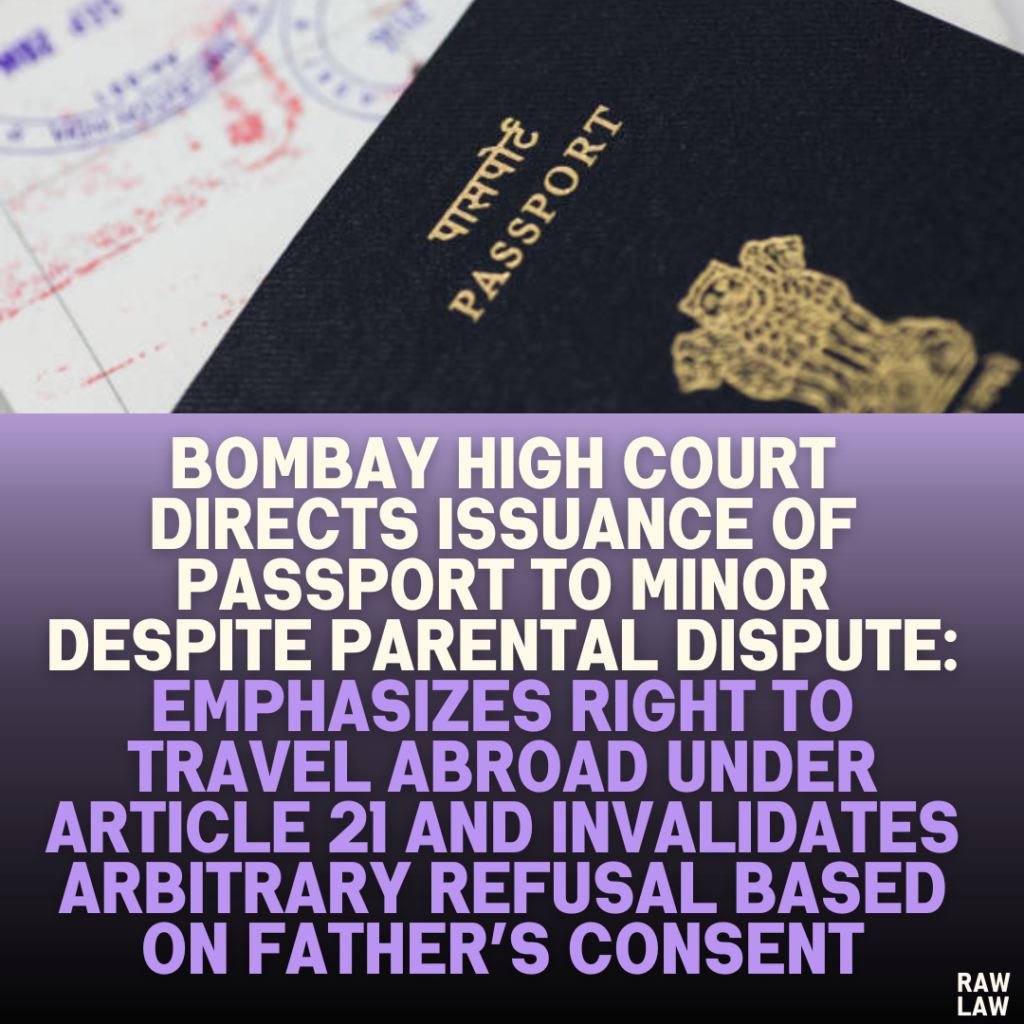Court’s Decision
The Bombay High Court directed the Regional Passport Office to issue a passport to the minor petitioner within two weeks, quashing the impugned communication dated November 18, 2024. The court emphasized that parental disputes cannot arbitrarily impede the fundamental right to travel abroad, as guaranteed under Article 21 of the Constitution.
Facts
The petitioner, a 16-year-old student, applied for re-issuance of her passport to participate in the “Sakura Science High School Programme” in Japan. She was eligible for the program, having scored 92% in her Class X exams. The petitioner’s mother, acting as her natural guardian, filed the passport application. However, the Regional Passport Office refused to process the application after the petitioner’s father objected to issuing the passport, citing that his consent had not been obtained.
The parents were embroiled in ongoing matrimonial disputes, including divorce and domestic violence proceedings. The petitioner’s mother had submitted Annexure-C, a declaration designed for cases where one parent refuses consent, but the Regional Passport Office insisted on either obtaining the father’s consent or a court order.
Issues
- Can a minor’s passport application be denied solely due to one parent’s refusal to provide consent?
- Does such a denial violate the minor’s fundamental right to travel abroad under Article 21?
- What is the role of Annexure-C in cases of parental disputes regarding a minor’s passport application?
Petitioner’s Arguments
- The petitioner’s mother, as her natural guardian, argued that the father’s refusal to provide consent was arbitrary and lacked valid grounds.
- The refusal violated the petitioner’s fundamental right to travel abroad, which is a component of personal liberty under Article 21.
- The mother had complied with legal procedures by submitting Annexure-C, a declaration allowing a single parent to apply for the minor’s passport in the absence of the other parent’s consent.
- The Passport Authority’s refusal to consider Annexure-C and their insistence on the father’s consent were unjustified and contrary to the law.
Respondent’s Arguments
- The Regional Passport Office contended that under the procedural framework, the father’s consent or a court order was necessary to process the application.
- The petitioner’s father argued that the mother had provided false information and misrepresented facts regarding her status as a single parent, which justified his objection.
- The father expressed his unwillingness to issue a No Objection Certificate (NOC) without further discussions or resolution of disputes.
Analysis of the Law
The court analyzed the procedural framework under the Passport Act, 1967 and the accompanying rules:
- Section 6 of the Passport Act, 1967:
This section outlines the grounds for refusal of passports. The court observed that none of these grounds applied in this case. The refusal based solely on the father’s objection was not supported by any valid statutory or procedural mandate. - Annexure-C Declaration:
Annexure-C explicitly provides for situations where one parent’s consent cannot be obtained due to ongoing matrimonial disputes. The mother had submitted this declaration, asserting that the court had not issued any order prohibiting the issuance of the passport. The Passport Authority’s failure to consider this declaration undermined the legal safeguards provided under the framework. - Fundamental Rights:
The court reiterated the principles laid down in Maneka Gandhi v. Union of India (1978 1 SCC 248), emphasizing that the right to travel abroad is a component of personal liberty under Article 21. Any restriction on this right must be fair, just, and reasonable, and cannot be arbitrary or oppressive.
Precedent Analysis
The court drew from the following precedents to support its decision:
- Maneka Gandhi v. Union of India:
The court reaffirmed that the right to travel abroad is a facet of personal liberty under Article 21 and cannot be curtailed without due process of law. - K.S. Puttaswamy v. Union of India (2017):
The case emphasized that fundamental rights, including personal liberty, must be interpreted expansively to include modern-day needs such as travel for education and personal development.
Court’s Reasoning
- The court observed that the petitioner’s father had not provided any valid legal or factual grounds to justify his refusal to consent. There was no court order restraining the mother or petitioner from applying for or receiving a passport.
- The Passport Authority’s insistence on the father’s consent, despite the submission of Annexure-C, was mechanical, unreasonable, and contrary to the law.
- The petitioner’s right to travel abroad for academic purposes, guaranteed under Article 21, outweighed the procedural objections raised by the father.
- The court emphasized the evolving importance of travel in contemporary times and the irreparable harm caused to the petitioner’s academic prospects by denying her the opportunity to participate in an international program.
Conclusion
The court set aside the impugned communication and directed the Passport Authority to issue the passport to the petitioner within two weeks. It underscored that administrative actions must align with constitutional principles and procedural fairness.
Implications
This judgment reinforces the protection of individual rights against arbitrary administrative actions. It clarifies the procedural requirements for passport issuance in cases involving parental disputes and underscores the judiciary’s role in safeguarding fundamental rights. The decision also highlights the importance of modern needs like travel for education in interpreting constitutional rights.




Pingback: Bombay High Court: Charity Commissioner Can Proceed with Removal of Trustees for Misconduct Under Section 41D of MPT Act Despite Pending Change Reports Under Section 22 - Raw Law